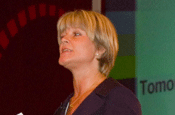
Hazlitt said it was a long-standing issue that needs to be addressed by the radio industry as a matter of urgency.
She is planning to set up a listener poll to rate the quality of ads on GCap's stations and the responses will be fed back to advertisers.
She stopped short of threatening to pull poor quality ads from the stations, but it is understood that this might be a last resort measure if the advertising and creative agency community failed to respond.
GCap has already taken unilateral action to stem the loss of listeners to the BBC by restricting ad breaks on two of its stations, Capital 95.8 and theJazz, to a maximum of two ads in a row.
The former Virgin Radio chief executive, who joined GCap on 1 May, said "the industry has forgotten how to entertain people" and suggested the latest Rajars, in which the BBC took a record 56% share, proved her point.
Addressing delegates at the conference, Hazlitt asked how advertisers were "getting away with it" and aired some examples of ads she considered to be particularly poor.
Mark Barber, planning director at the Radio Advertising Bureau, acknowledged that there was room for improvement in radio advertising, saying "to improve the overall quality of radio is a good ambition to have".
He added: "Being a linear medium, the upside of good radio advertising is that you get traction and cut-through. At the same time, bad ads are that bit more intrusive than other media and that accentuates the problem sometimes."
Barber is leading the RAB's Radio Advertising Effectiveness Tracker, which measures commercials against the "five Is" - involvement, identity, impression, information and integration.
Of these, Barber singled out "impression" as vital to a radio brand. He added: "The impression an ad leaves is perhaps the most important in this context because if it leaves a positive impression it will reflect well on the brand."



_1.jpg)
.jpg)
